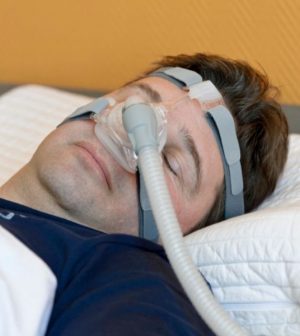- Could Your Grocery Store Meat Be Causing Recurring UTIs?
- Are You Making This Expensive Thermostat Error This Winter?
- Recognizing the Signs of Hypothyroidism
- 10 Strategies to Overcome Insomnia
- Could Artificial Sweeteners Be Aging the Brain Faster?
- Techniques for Soothing Your Nervous System
- Does the Water in Your House Smell Funny? Here’s Why
- Can a Daily Dose of Apple Cider Vinegar Actually Aid Weight Loss?
- 6 Health Beverages That Can Actually Spike Your Blood Sugar
- Treatment Options for Social Anxiety Disorder
Skipping CPAP May Mean Return to the Hospital for Apnea Patients

If people with sleep apnea who’ve been hospitalized for any reason don’t use their breathing treatments when they return home, they’re much more likely to end up back in the hospital.
They were 3.5 times more likely to be readmitted for any reason within 30 days, a new study found. And those who didn’t comply with their breathing treatment were more than twice as likely to be readmitted to the hospital due to a heart disease condition within 30 days.
The breathing treatment is called continuous positive airway pressure (CPAP). It involves wearing a face mask that’s hooked up to a machine that sends a constant stream of air down the throat, to keep people’s airways open while they sleep.
“Any patient that comes to the hospital for any reason — it could be orthopedic surgery or pneumonia or something else — who also has sleep apnea needs to know if you don’t use your CPAP, the chances are much higher you’ll be readmitted to the hospital within 30 days,” said study author Dr. Behrouz Jafari. He’s director of the sleep program at the Veterans Affairs Long Beach Healthcare System in California.
The study involved 345 patients with severe sleep apnea who had been hospitalized at a VA medical center any time from 2007 to 2015. Most were men over age 62.
Jafari said the researchers defined compliance with CPAP therapy as using the device at least 70 percent of nights for at least four hours a night. Anything less than that was considered noncompliant.
Why is it so important to use CPAP consistently?
People with sleep apnea stop breathing briefly multiple times a night when their airways close. During this time, the body and brain are deprived of oxygen. This brief period of no breathing is called an apnea.
Dr. Praveen Rudraraju, director of the Center for Sleep Medicine at Northern Westchester Hospital in Mount Kisco, N.Y., said the number of times a person stops breathing per night helps define the severity of sleep apnea.
“[Fewer] than 15 apneas an hour is mild sleep apnea. Fifteen to 30 apneas an hour is moderate,” Rudraraju explained. Anything more is considered severe sleep apnea.
All those small sleep disruptions leave people feeling tired during the day. In fact, Jafari said that daytime fatigue if you’ve slept enough hours during the night is a big clue that you might have sleep apnea.
Both experts said that CPAP is the “gold standard” treatment for sleep apnea because it keeps the airway open throughout the night, which stops apneas from occurring.
So why wouldn’t people use the machines as directed?
“Causes of noncompliance can come from so many things. Patients might not like the mask or they might not like the way the pressure feels. Some patients have post-traumatic stress disorder and can’t wear the mask,” Jafari said.
“There’s a learning curve for every patient. I ask my patients to come back in a week or so to make sure they’re comfortable with the mask and the fitting. We can change the mask, and we can adjust the pressure,” Jafari said, adding that what’s important is that you let your doctor know if you’re having a problem.
Rudraraju, who’s not connected to the study, agreed that adjustments can be made to make patients more comfortable, and there are good reasons to make sure you can wear your CPAP.
“It’s important to use the CPAP consistently, not just here and there. And this study shows how important it is to be adherent,” he said.
If a patient just can’t tolerate CPAP, there are other treatment options for sleep apnea, both experts said.
“There’s an oral appliance device that brings the jaw forward that’s similar to a mouth guard, but this can’t be used on someone who’s very obese. It’s best for mild to moderate sleep apnea,” Jafari said.
Jafari also noted that weight loss can help ease sleep apnea symptoms.
Rudraraju pointed out there’s a minimally invasive surgical procedure that uses a device similar to a pacemaker that stimulates the nerves and the muscles to keep the airway open.
The study was published recently in the Journal of Clinical Sleep Medicine.
More information
Learn more about sleep apnea from the U.S. National Heart, Lung, and Blood Institute.
Source: HealthDay
Copyright © 2026 HealthDay. All rights reserved.










